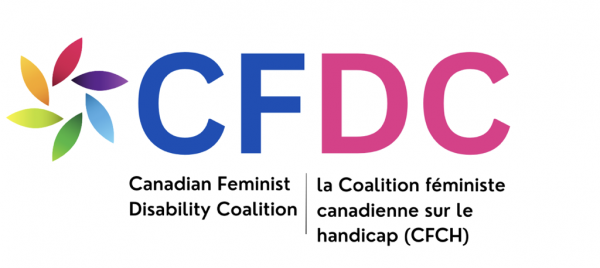
*Pour des ressources en français, consultez les liens au bas de la page. Vous y trouverez le rapport de projet, et deux vidéos avec sous-titres en français.*
Funded by the federal department of Women and Gender Equality Canada (WAGE), the CFDC engaged in systemic change to support a feminist response and recovery from the inequitable impacts of COVID-19 in Canada. The CFDC team was inclusive of diverse women and girls with disabilities, recognizing a spectrum of physical, intellectual, and mental health disabilities and impairments, as well as how disabilities intersect with experiences of racialization, gender diversity, age, and living situations.
The CFDC was comprised of the Live Work Well Research Centre (LWWRC), as well as the key partners DAWN-RAFH Canada, Indigenous Disability Canada/British Columbia Aboriginal Network on Disability Society (IDC/BCANDS), and the Disability Justice Network of Ontario (DJNO). Siobhan Grant, Project Coordinator, and Sharon Findlay, Project Manager, provided support to the project from November 2021 until March 2024, when the network transferred to its new home with DAWN-RAFH Canada as the Hummingbird Feminist Disability Coalition (HFDC).
The Canadian government’s COVID-19 response highlighted the significant gaps and barriers in social, economic, and political legislation, policies, and practices encountered by diverse women and girls with disabilities. Diverse women and girls with disabilities are underrepresented in leadership, advocacy, and research in Canada. The experiences and knowledge of women and girls with disabilities are often ignored or added after the fact in gender-equality initiatives. This means that diverse women with disabilities encounter high rates of unemployment, poverty, violence, and victimization, as well as facing significant barriers to education and healthcare.
The CFDC and now the HFDC addresses these significant gaps and issues as well as fostering policies and practices that empower and advance diverse women and girls with disabilities in leadership, participation, and advocacy across economic, social, and political spheres. The CFDC also networked and collaborated with stakeholders to advance gender equality and tackle discriminatory policies and practices that affect the full economic, social, and political status of diverse women and girls with disabilities.
In order to network and collaborate with various civil society, community, and advocacy stakeholders to advance gender equality for diverse women and girls with disabilities, the CFDC convened and engaged a 10-member advisory group and four regional hubs consisting of British Columbia, Ontario, Quebec, and Atlantic Canada.
Among the activities and products of the CFDC were
-
A National Meet and Greet on May 31, 2023, which marked the first gathering of the CFDC team, the Regional Coordinators, and their hub members.
-
A Facebook Group and monthly workshops.
-
Digital workshop series, each spanning five weeks, where participants had the opportunity to share their unique lived experience through various digital media, culminating in a short artistic digital storytelling piece.
For more information:
- Read the December 2022 University of Guelph news release announcing the project
- Read an interview with the CFDC Project Coordinator, Siobhan Grant
- Read an interview with two of the Regional Coordinators, Tamara Angeline Medford- Williams and Maggie Lyons-MacFarlane
- Read the English version of the 2024 Narrative Report Creating Connections: The CFDC’s 30-Month Journey to Build a National Network in English
- View the video of member testimonials (3:21) at the March 2024 launch of the Hummingbird Feminist Disability Coalition (audio in English, with the option of selecting captions in either English or French)
- View the video of presentations (10:41) at the March 2024 launch of the Hummingbird Feminist Disability Coalition (audio in English, with the option of selecting captions in either English or French)
En français:
- La version française du rapport narratif de 2024 « Créer des liens : 30 mois d’efforts de la part de la CFCH pour établir un réseau national » se trouve ici
- La vidéo des témoignages de membres (3:21) lors du lancement de la Hummingbird Feminist Disability Coalition en mars 2024 se trouve ici (audio en anglais, avec possibilité de sélectionner les sous-titres en anglais ou en français)
- La vidéo des présentations (10:41) lors du lancement de la Hummingbird Feminist Disability Coalition en mars 2024 se trouve ici (audio en anglais, avec possibilité de sélectionner les sous-titres en anglais ou en français)